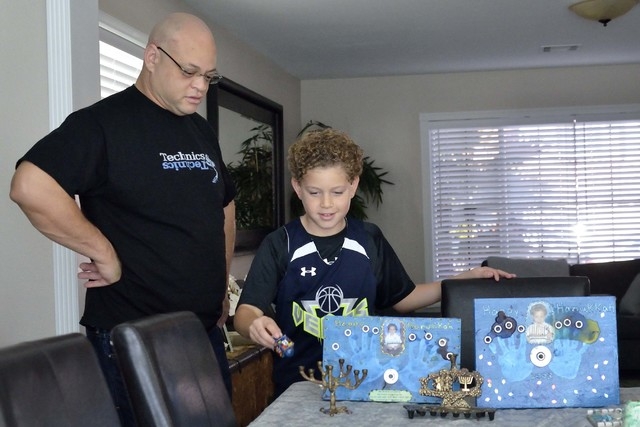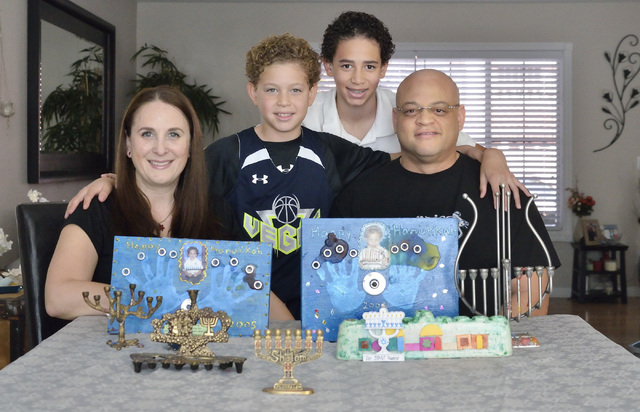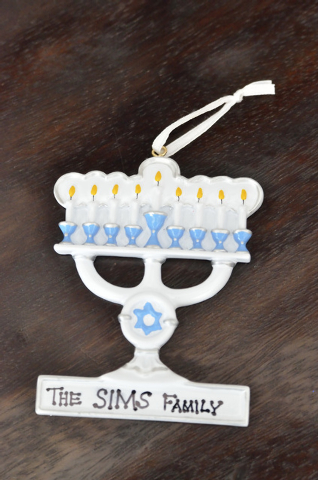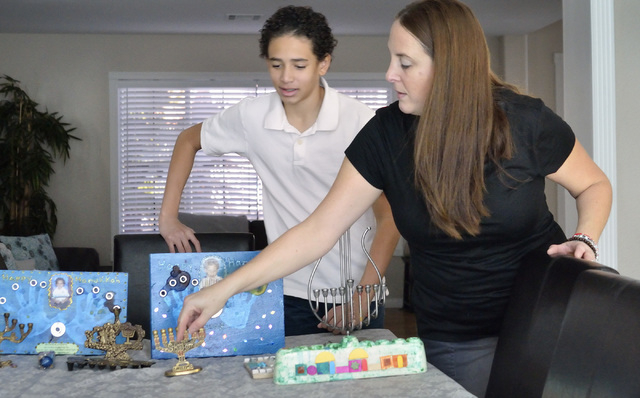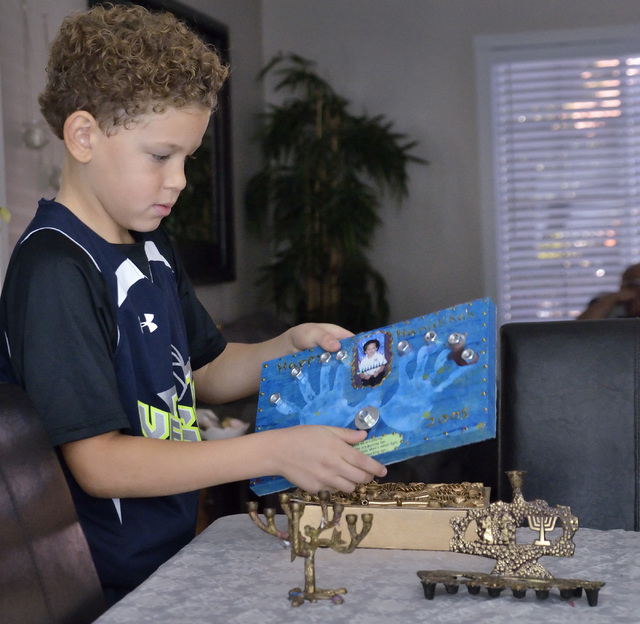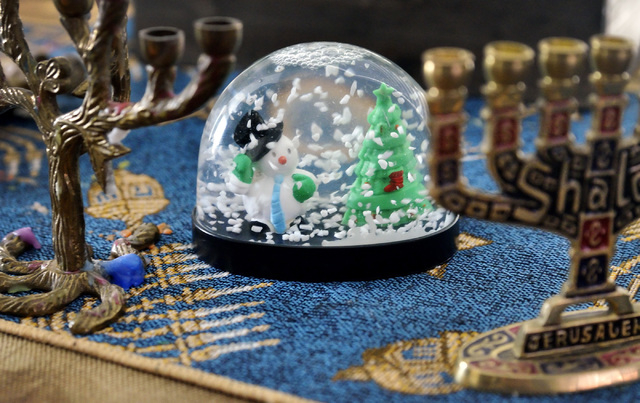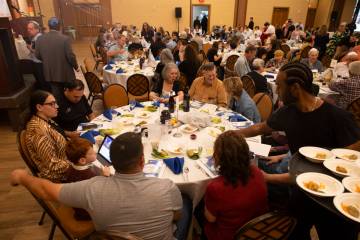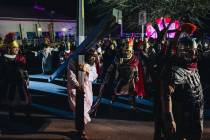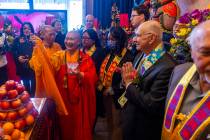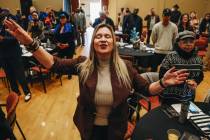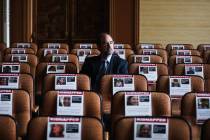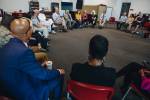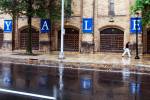‘December dilemma’ challenges interfaith families
Davida Sims has always been fond of Christmas. Even as a kid, she recalls, “I really had always wanted a Christmas tree.”
But Sims grew up in “a pretty traditional Jewish family,” she says, and entreaties to her parents for a “Hanukkah bush” — a sort of Christmas tree analog in tenuous Judaic wrapping — fell on deaf ears.
“My parents didn’t buy it,” Sims says with a laugh. “That was one thing they were not going to do.”
Now, Sims is married, has two sons and celebrates a traditional Hanukkah much like the ones she knew growing up. But Sims and her family also add a touch of Christmas to their year-end holiday celebration, too.
Sims’ husband, Damon, was raised in a Christian household and celebrated a traditional Christmas. The year-end customs the family has created allow her sons to learn about and appreciate both of their parents’ holiday heritages, Sims says.
The traditions they enjoy — a Christmas tree with Star of David topper, nightly menorah lighting during Hanukkah, traditional foods representing both Damon’s and Davida’s heritages — are the family’s solution to what’s often called the “December dilemma,” which Jewish and non-Jewish spouses experience each year as Christmas and Hanukkah arrive.
The conundrum can occur in any marriage of a Jewish spouse and a non-Jewish spouse. But it’s particularly acute for Jewish-Christian families, because both holidays — Hanukkah as a Jewish festival of religious freedom and identity, and Christmas as a Christian observance of Jesus’ birth — tend to fall near each other on the secular calendar. Hanukkah begins Tuesday evening this year.
Rabbi Sanford Akselrad of Congregation Ner Tamid says the December dilemma can be more accurately referred to in the plural, given its evolution during the past half-century or so.
For example, in the years after World War II, both Christmas and Hanukkah, for better or worse, became increasingly commercialized. It was in those years, Akselrad says, as Christmas became a bigger gift-giving holiday, that Jewish parents “began to feel sensitive that perhaps their kids were missing out on something.”
“In the early 1960s, when I grew up, the intermarriage rate was 5 percent,” Akselrad says, and “for the most part, Jewish households were homogeneous and Christian households were homogeneous. So, really, the December dilemma was defined as, ‘What do we do to make sure our children feel secure in being Jewish when they’re a minority?’ ‘How do we make sure our children don’t feel left out, because their non-Jewish friends were opening all these presents?’ ”
For some Jewish parents, the answer was to make Hanukkah “a bigger deal in some cases,” he says.
Then, as the 20th century progressed, increased intermarriage among non-Orthodox Jewish and non-Jewish spouses added another dimension to the December dilemma.
Akselrad notes that one recent estimate holds that, in the Reform movement of Judaism, “upwards of 70 percent are marriages out of the faith. More Jews are marrying people who are not Jews, and the result is the dilemma (of) two religions in one household. So the dilemma now is, ‘How do we respect both faith traditions?’
“So we put a Jewish star on top of the Christmas tree. So we make sugar cookies in the shape of Jewish stars,” he says.
“All of these solutions — in quotes — are coming from people who are wrestling with real-time changes. They’re not coming from rabbis saying, ‘This is what you should do and this is what you should not do.’ They’re coming from people who say, ‘Know what? I like this, I don’t like that, this is what I’m going to do.’ They come up with their own traditions.”
What was it about Christmas that fascinated Sims as a kid?
“I grew up in America,” she says. “And it just seemed that’s, like, just part of America that I felt I’d really missed out on.”
Sims remembers one year when she rode her bike to a dollar store, “bought a bunch of tchotchkes and wrapped them up, and took a little piece of butcher paper and drew a tree and put it in my closet and put little presents under it. I’m a fourth-generation American and I just felt like there was a piece of American culture I was missing out on.”
“I didn’t get that it had anything to do with Jesus or anything,” Sims adds. “But I had a soft spot for Christmas.”
Sims and her husband have been married 17 years. They have two sons, Miles, 12, and Cole, 10, both of whom attend classes at the Adelson Educational Campus. The boys are being raised in the Jewish faith and Sims describes her home as a Jewish household.
But when she and Damon were preparing to celebrate their first holiday season together, “I said to him, ‘I really want a Christmas tree.’ He said, ‘You don’t have to do that.’ I said, ‘No, I really want a Christmas tree.’
“He talked about buying a plastic one. I said, ‘No, it’s gotta be fresh.’ ”
“I was so excited,” Sims adds. “I did the whole thing. I went Christmas shopping for decorations. I had none of the family heirlooms, nothing like that, so I went out and did the Christmas shopping. I even went to, like, Bed, Bath &Beyond and Body Works and bought little things to put under the tree for myself, because I didn’t know how it works.”
But when the boys arrived, they had a decision to make.
“And I felt really excited, honestly, about the idea of just, whatever we did, we were creating this brand-new Sims family tradition in that my kids were going to think this is how it’s done and be excited about it when they get older,” she says.
The family observes each night of Hanukkah by lighting candles, choosing from among the many menorahs they’ve collected over the years. The boys receive small Hanukkah gifts — a book or a game — and, on one night, Sims will make traditional latkes, or potato pancakes.
Then, the family also celebrates a bit of secular Christmas. They do have a tree, but it’s topped with a Star of David and some of its ornaments feature menorahs.
However, Sims says, “other than that, we don’t mix it and, obviously, we have very secular decorations.”
On Christmas morning, the family awakens, shares hot cocoa and sings, and “then we go to my mother-in-law’s to see her tree, and she does have Christmas dinner,” Sims says.
By celebrating both holidays, the children are able to learn about and appreciate both sides of their familial heritage, Sims says.
“That’s the importance,” she says. “It’s literally the Sims’ family Christmas we got to create, so my boys have these wonderful family traditions. That’s what it’s really all about.”
Although intermarriage between non-Orthodox Jewish and non-Jewish spouses has become more common, Akselrad says couples seldom seek him out for counseling about solving the December dilemma.
“I don’t have a lot of people knocking on my door, (saying) ‘I’m wrestling with it,’ ” he says, but “I know it by observation.”
Maybe it’s embarrassment. Or intimidation. Or simply that couples assume they know what a rabbi will say.
“I don’t think someone would say, ‘Rabbi , is it OK if I had a Christmas tree?’ because they know the rabbi will say ‘No,’ so why ask the question?” Akselrad says. “I think there’s some embarrassment.”
Yet, he adds, “I know it’s on people’s minds.”
And in his own mind? “It’s going to depend on the individual,” Akselrad says.
Akselrad advises couples seeking to enter into interfaith marriages that, even before they marry, they need to decide on a tradition for their homes.
Otherwise, he says, there’s a potential for not just ambiguity, but conflict.
Does Sims ever feel, maybe, a twinge of guilt about recognizing Christmas in her home?
“Yeah,” she answers. “I work in a Jewish day school, and my kids are going to a Jewish day school, so there’s definitely even been moments in big groups of people (when) I didn’t talk about it. But I also have always encouraged my kids to talk about it, that it doesn’t mean you’re not Jewish and doesn’t mean there’s anything wrong with that.”
Still, she says, sometimes “somebody might say, ‘Oh, really? You do Christmas?’
“I would say, realistically, that this is my husband’s favorite childhood memory. How could I ever say to him, ‘No, you’re not going to share with your kids the greatest thing from your childhood’? Religion or not, that just can’t be right.”
Contact reporter John Przybys at jprzybys@reviewjournal.com or 702-383-0280.



